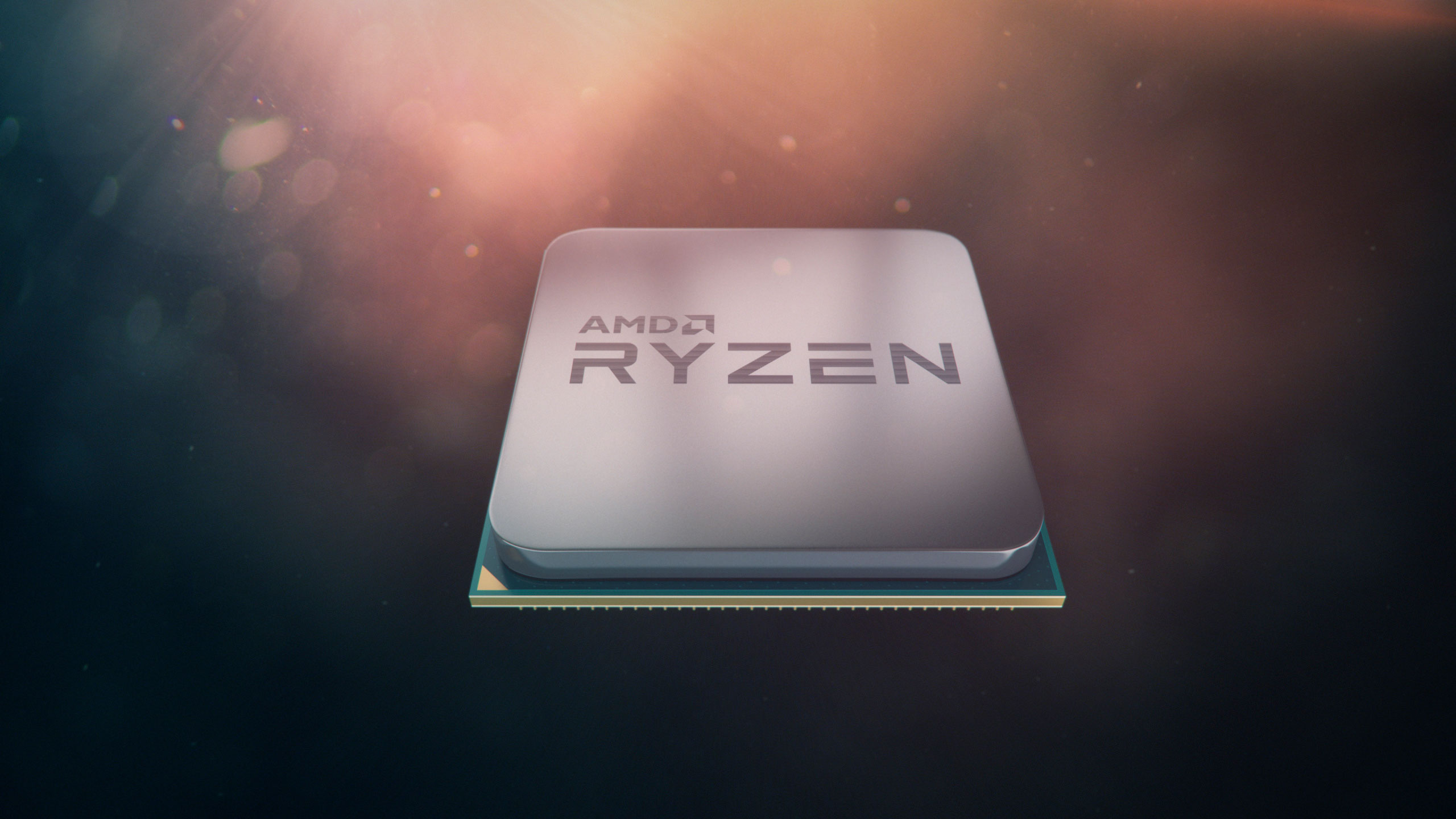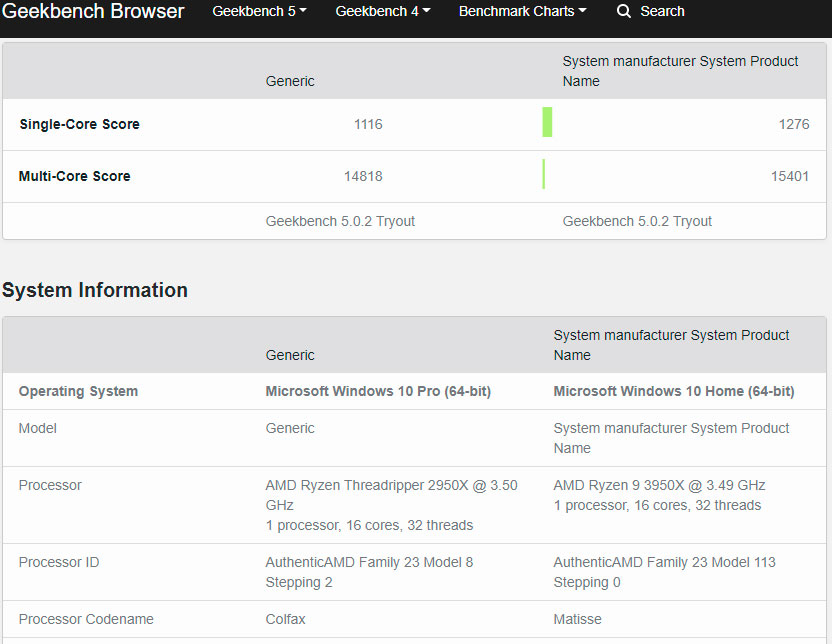AMD Ryzen 9 3950X Outperforms Threadripper 2950X in Early Geekbench Listings
The AMD Ryzen 9 3950X, whose release has been pushed to November, already has two Geekbench 5 listings, giving us a potential glimpse of the performance capabilities of AMD's upcoming 16-core, 32-thread CPU.

As spotted by a well-known leaker who goes by @TUM_APISAK on Twitter, there are currently two Geekbench 5 entries for the Ryzen 9 3950X with dissimilar scores.
The first system with Gigabyte's B450 Aorus Pro WiFi motherboard scored 1,314 and 11,140 points in the single-and multi-core tests, respectively. The second system, which used Asus' Prime X570-P motherboard, put up a single-core score of 1,276 points and a multi-core score of 15,401 points. Both systems appear to have used DDR4-3600 memory modules.
AMD is marketing the Ryzen 9 3950X as having a 3.5 GHz base clock and 4.7 GHz maximum boost clock, which is only attainable on a single core. Based on the Geekbench entries, the CPU maintained a variable all-core boost clock speed between 4.2 GHz and 4.3 GHz during both benchmark runs.

The Ryzen 9 3950X and AMD Ryzen Threadripper 2950X belong to different market segments. Both chips are equipped with 16 cores and 32 threads, and they have the same 3.5 GHz base clock; however, the Ryzen 9 3950X has a 300 MHz higher boost clock and twice the L3 cache as the Ryzen Threadripper 2950X.
We should always view early benchmarks with skepticism. However, if the Geekbench listings are accurate, the Ryzen 9 3950X appears to outperform the Ryzen Threadripper 2950X by up to 14.3% in single-core workloads. When it comes to multi-core workloads, the difference is around 3.9%. If the Ryzen 9 3950X is truly able to surpass the Ryzen Threadripper 2950X while having a 75W lower TDP (thermal design power) , that'd be a testimony to AMD's Zen 2 microarchitecture, as well as TSMC's 7nm FinFET manufacturing process.
The Ryzen 9 3950X will have a $749 MSRP when it finally comes out next month. In comparison, the Ryzen Threadripper 2950X, which debuted a little over a year ago at $899, currently sells for as low as $670. The times are definitely changing. It's pretty impressive that soon you'll be able to purchase a HEDT-grade processor without having to pay a king's ransom for it.
Get Tom's Hardware's best news and in-depth reviews, straight to your inbox.

Zhiye Liu is a news editor, memory reviewer, and SSD tester at Tom’s Hardware. Although he loves everything that’s hardware, he has a soft spot for CPUs, GPUs, and RAM.
-
jimmysmitty Not much of a surprise TBH. Its got more cache, supports higher memory speeds and has a much lower TDP which allows it to hit higher boost clocks. Thats all on top of other IPC improvements.Reply -
derekullo Reply
For me equal performance would have been acceptable.NightHawkRMX said:If they performed the same or the 3950x performed worse, I would be worried tbh.
Don't forget the Threadripper 2950X has a TDP of 180 watts.
The Ryzen 3950x will have a TDP of 105 watts, a 58% savings in power.
Having better performance/higher clock speeds is just icing on the cake. -
jimmysmitty Replyderekullo said:For me equal performance would have been acceptable.
Don't forget the Threadripper 2950X has a TDP of 180 watts.
The Ryzen 3950x will have a TDP of 105 watts, a 58% savings in power.
Having better performance/higher clock speeds is just icing on the cake.
Except the TDP drop is mostly due to a smaller process node AND half the memory channels. The 3950X still hits higher clocks due to this. One of the downsides to putting more components on the CPU die is it can increase TDP with lower clocks.
I would think in cases where memory bandwidth is more a requirement the 2950X will still perform better. -
derekullo Replyjimmysmitty said:Except the TDP drop is mostly due to a smaller process node AND half the memory channels. The 3950X still hits higher clocks due to this. One of the downsides to putting more components on the CPU die is it can increase TDP with lower clocks.
I would think in cases where memory bandwidth is more a requirement the 2950X will still perform better.
I found some benchmarks on the following site using 12c/24t Threadripper 2920X and Ryzen 3900x
https://technical.city/en/cpu/Ryzen-Threadripper-2920X-vs-Ryzen-9-3900X
I was expecting Threadripper to win with Winrar due to memory bandwidth but being a single core benchmark was too much in Ryzen's favor.
Threadripper did win the TrueCrypt AES by a decent margin. -
jimmysmitty Replyderekullo said:I found some benchmarks on the following site using 12c/24t Threadripper 2920X and Ryzen 3900x
https://technical.city/en/cpu/Ryzen-Threadripper-2920X-vs-Ryzen-9-3900X
I was expecting Threadripper to win with Winrar due to memory bandwidth but being a single core benchmark was too much in Ryzen's favor.
Threadripper did win the TrueCrypt AES by a decent margin.
It just goers to show that single core and clock speed matter more in most consumer applications than memory benchmarks. However I would love to see encoding. With almost 2x the memory bandwidth I can imagine it would help especially if the program also takes advantage of more memory.